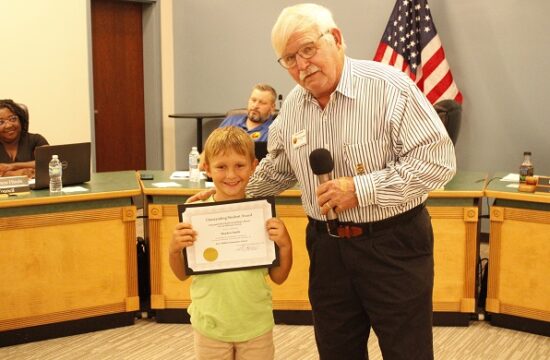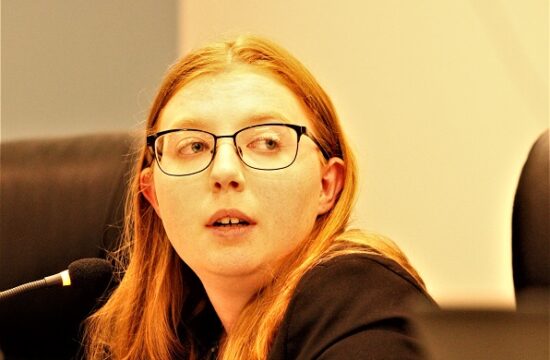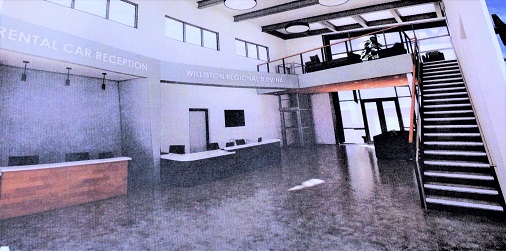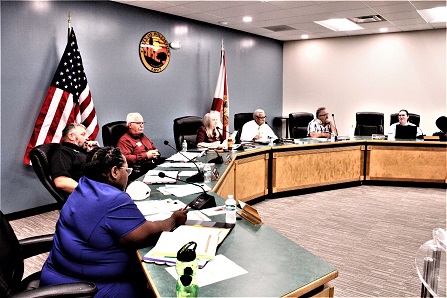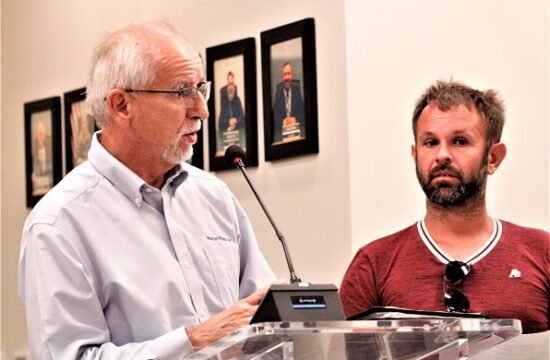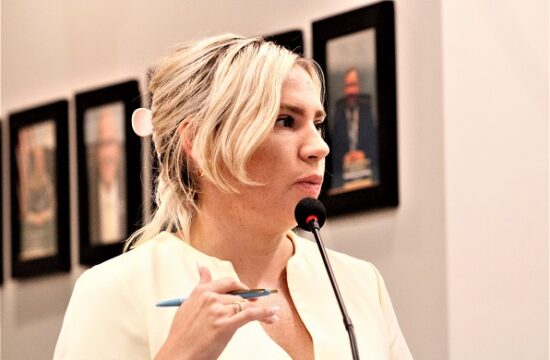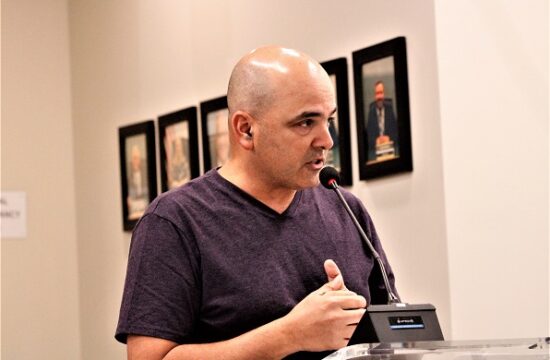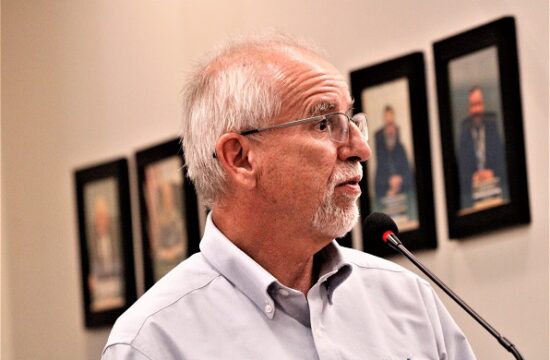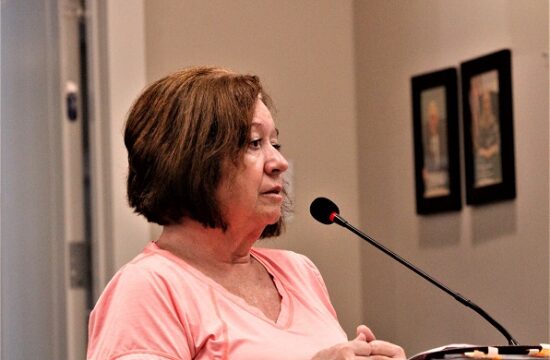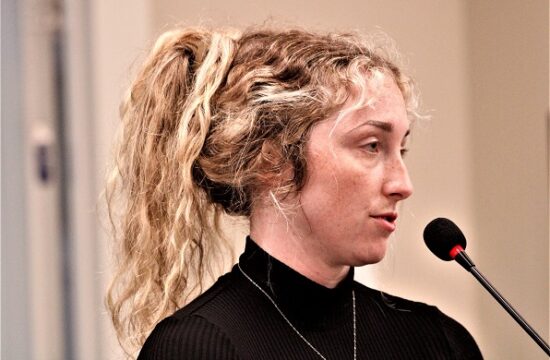By Terry Witt – Spotlight Senior Reporter
A festering controversy on the Williston City Council wasn’t resolved at this week’s board meeting but it was brought to light at the request of Mayor Charles Goodman.
The mayor said he was falsely accused by Council President Debra Jones of inappropriately using his city credit card to make personal purchases, an allegation he emphatically denied.
He was asked to repay the $625.25 after a meeting with Jones and the city attorney. He repaid the money, though in protest.
Goodman was elected in March. He said his credit card purchases were related to his work as a volunteer contractor overseeing the project and doing carpentry work, but when allegations persisted that he had inappropriately used city credit cards, he felt it was best to make the issue public in a council meeting.
“I have been attacked and slandered four times by persons claiming I inappropriately spent city money and even stole city money. To those persons, and to the public, I categorically deny the accusations and feel that the citizens and city council should have the entire story. That is why I am making this statement in a public meeting,” Goodman said.
Jones never backed down from her allegation that Goodman made inappropriate purchases with his city credit card. She said the credit card purchases were discovered only after she noticed money was disappearing from the city council budget line item, and it was money the board hadn’t spent.
She conceded she isn’t certain the mayor was ever made aware of the rules governing city credit card use or given an expense form to fill out, but nevertheless, as a city elected official, she felt she was looking after city taxpayer dollars when she asked him to repay the funds.
While most of the purchases were for gasoline, she said the city found that he also bought a pair of reading glasses from Walgreens using the city credit card.
“I was the council member who requested the money be returned. I’m sure you probably figured that out,” Jones said. “I thought it was my place as a council member to watch out for the money that belongs to the city and thereby the taxpayers of the city of Williston,” she said.
In his prepared statement to the council, Goodman provided a history of how he became involved in the animal shelter project and who asked him to serve as the building contractor. He had worked as a licensed building contractor before he retired many years ago.
He said he became aware that the non-profit Williston Community Animal Shelter, Inc. (WCAS) was building a new animal shelter. The city council had contributed $75,000 to the facility along with a generator and diesel to operate the building, which was estimated by staff to be worth about $50,000.
At the time he became involved in WCAS, he said the organization had a contract with a private contractor. The contract was never completed and the contractor withdrew. Goodman said he was asked by the WCAS board to help get the shelter built. He contacted several other contractors, all of whom were going to charge roughly $100,000, or more, on top of costs to build the structure. He knew adding that much cost to the project would make it unaffordable to WCAS.
“I spoke with a young contractor, whom I had helped to get his license years ago, and asked if he could help. His answer was that he would be the contractor of record for a flat $35,000 fee, only if I would volunteer, unpaid, to be the on-site supervisor and personally guarantee that all bills would be properly paid. I agreed to this arrangement and then construction began. Being a master contractor, I have done much of the work personally and used my own trucks and trailers to pick up and deliver materials, and my own tools in the construction process,” Goodman said. He is a master carpenter.
After assuming office in March following the election, Goodman said City Clerk Latricia Wright gave him a credit card. He said there were no instructions given to him regarding the use of the card but he was told the spending limit was $7,000.
“I was shocked because I had been on the Williston City Council for over eight years and had never been given a credit card,” he said.
He said he continued working on the shelter and believed he was saving the city money because WCAS had limited funds. After construction costs skyrocketed, he was afraid that any part of the project that wasn’t finished would have to be funded by the city.
“For months WCAS offered to compensate me for the large amount of money I was needing to spend on the shelter out of my own pocket for gas, but I was trying my best to stretch their budget, so I declined,” he said.
After receiving the mayor’s credit card, with no instructions, Goodman said he looked at the charter and read that the mayor will be compensated for all of his expenses, which he thought would include reimbursing the personal funds he spent on building the animal shelter for the city.
“That is not covered in the charter. So, I saw it as an engagement in helping this project get completed,” he said. “For the next several months, I used the mayor’s credit card to purchase gas, used exclusively for the many miles I had to use my personal vehicle to purchase and pick up materials for the shelter. I took receipts for this gas to the city clerk and she was surprised, saying it was out of the ordinary. I explained to her exactly what I was doing and offered to show her receipts for gas purchases for my personal use to show that I was not using city money for personal use,” he said. “A short while later I received a visit from the previous city manager, Mr. Jackie Gorman, about this. I again explained exactly what I was doing and her response to me, and to the clerk, was that we would have to create a new line item for the mayor. At that point, I thought the matter was settled.”
Goodman said he got sick with COVID at that point as did several other people at a city meeting. Because of his exposure to Agent Orange, while serving as a combat soldier in Vietnam, he said he knew there was a possibility that he might not survive the illness. He went into isolation, hoping to spare his wife, but to no avail, she caught COVID, too.
“While recovering from COVID, I received a text message from a council member telling me that I could not use the mayor’s credit card for personal gas, and I was astounded because I was very sick. My response was anger,” he said. “After recovering and returning to my duties, the same council member again demanded that I return the money to the city. I pointed out that one council member cannot make demands of the mayor for the entire council and made plans to bring the matter before the entire council to decide if I needed to return the gas money. If I paid the money back to the city, then WACS would reimburse me for my expenses, so there was nothing to be lost or gained by me personally.”
Goodman said he was asked to meet with the city attorney and he agreed. The attorney asked him to withdraw the item from the agenda while they worked on a solution. Goodman said he reluctantly agreed, “because my experience is that this type of thing needs to be thoroughly exposed to the public and the city council. To my knowledge, the city attorney never came back with an opinion.”
“I ultimately decided to give the money back to the city and let WCAS pay for my gas expenses, which they did willingly. At that time, I also gave the city clerk back the credit card that was given to me as the mayor, because there were no guidelines for its use and it was not clear to me the purpose of the card. I was advised to let the matter drop, as it was resolved by returning the money to the city,” Goodman said. “I felt, and still feel, that everything I did was in the best interest of the city. A non-profit organization can do things less expensively than the city, as they can get volunteers and reduced prices from vendors, just because they are a non-profit doing good work. My view is that for every dollar the non-profit cannot use when they run out of money, the city will have to pay $10 in costs, as nobody volunteers for a municipality to work for free.”
Jones provided the council with an Aug. 1 letter she gave Goodman making him aware of her concerns about the credit card expenditures and how an investigation by the city revealed that the credit card spending started just days after he was issued the card in April and continued through the July statement.
“Review of the May 2022 invoice showed two April 2022 charges for gasoline in Ocala and Gainesville (times two) and Williston. The July 2022 invoice showed more charges through June 2022 for gasoline in Williston and Gainesville, along with a charge at Walgreens that I am told is for personal eyeglass readers. It was noted that staff spoke to you about the use of your credit card in May, so I waited to see if there were additional charges to your card in June. As stated above the July invoice did show three additional charges in early June. Please see copies of the credit card statements included in the communication for reference,” Jones said in her letter.
“Per the City Charter, “The Mayor shall receive his actual and necessary expenses in the performance of his duties of office,” Jones wrote. “The credit card issued to you by the City of Williston is for bona fide charges for the benefit of the work of the City of Williston and its residents. This card should not be used for personal use or other personal items. The city uses the attached “travel and per diem form” for travel and mileage reimbursement. As you can see, it requires you to list the purpose of the travel, the beginning point, the destination, and the mileage log. Reimbursement is paid via the IRS mileage rate for valid travel required for city business. If you were away at an event on behalf of the city, such as visiting your legislator in Tallahassee or a regional or Florida League of Cities event, then the credit card may be needed for food or lodging expenses, as preplanned for the event. It could also be used for emergency purposes when deemed necessary for city expenses.”
“Your total current credit card expenditure for the seven personal fuel charges and the one other item currently comes to $625.85. At this time, I am requesting this $625.85 be repaid back to the city at your earliest convenience, and certainly no later than our City Council meeting on August 16, 2022. If you would like to discuss this matter with me, please contact me via my city email or my cell phone,” Jones said concluding her letter.
Jones told the council at the Nov. 8 board meeting she didn’t feel the purchases Goodman made with the credit card had anything to do with city business. She said the animal shelter he was helping build wasn’t owned by the city at the time he spent the money. It will eventually be turned over to city ownership when completed.
“I just feel like it was inappropriate for him to use the card for purchases of gas that had anything to do with the animal shelter that were not city related because we do not currently own the animal shelter yet,” she said. “I’m giving you what I gave him because if you feel any different than that…and that’s pretty much what we told him in the meeting with the attorney, he could bring it to you all and ask if he could do it, and if you gave him permission, an extra line item would need to be added to the budget,” Jones said.
Councilman Michael Cox asked Jones if the city has rules for city credit card use.
“As I explained in my letter there is a travel and mileage form,” Jones responded. “I don’t know that he was given the form at the time he was given the credit card, but this form is when you put your expenses. If he had bona fide expenses for fuel, he might be reimbursed for it and mileage (but not both).”
Jones asked the council members if they wanted to make additional comments. They had nothing to say.
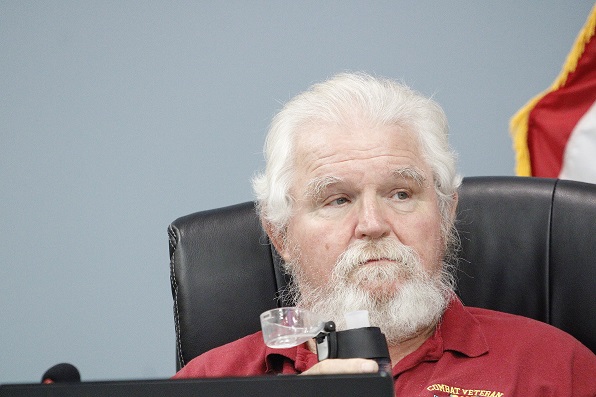
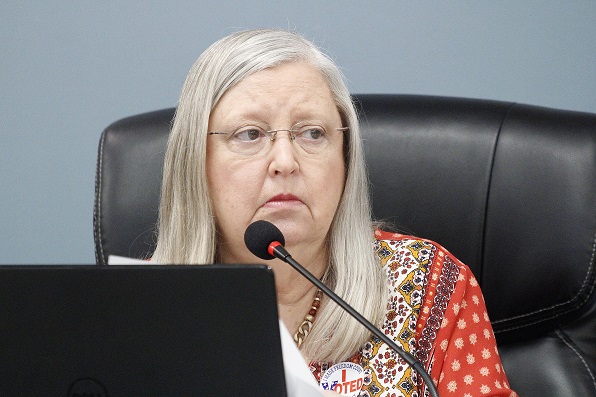
—————————-
City of Williston Regular Meeting November 8, 2022; Posted November 11, 2022



